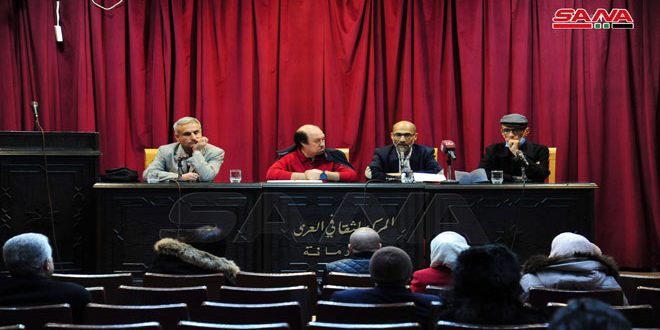Within the framework of its cultural invasion against the Arab nation, Zionism has sought to distort literature and use it as means to disseminate its evil and false ideas. This extremist movement used literature to achieve its goals through adopting false stories and spreading allegations to justify the Zionist occupation of Palestine and the displacement of the Palestinians.
Means of confronting this Zionist literature and its promoters was the main theme of a symposium held on Tuesday at the Arab Cultural Center in Damascus under the title “Confronting the Cultural invasion, Zionist Literature as an Example”.
The symposium, in which a number of Arab writers and researchers took part, sheds light on the role that can be played by Arab intellectuals to strongly fend off the content of the Zionist literature and on Zionism’s trends in Literature and on Zionism’s attempts to penetrate Arab literature and falsify facts.
Critic Omar Joum’a said that Zionist novels have relied on characters drawn from the Talmud. They have focused on portraying the Zionists in a positive way and on distorting the image of the Arabs, as in the novel (A Star in the Wind) by Robert Nathan.
According to Joum’a, the Zionist poet Jacob Basar in his poem “The Next War” stressed that the Zionist entity should always be ready to launch wars. This indicates the aggressive nature of this movement.
On his part, researcher Ali Badran said that the literature being taught in the schools and universities of the Zionist occupation is based on teaching youth in accordance with the Zionist ideology and on feeding the extremist feelings since childhood, perpetuating violence and distorting the image of the Arabs and Muslims.
Zionist education, Badran added, depended on Jewish and Zionist religious and cultural terms of reference that were known for racism, aggressiveness and subordination to the Zionist aspirations.
Poet Mohammad Sa’eed Al-Ateek, on his part, said that the Zionists have devoted their efforts in culture and literature to spreading the falsehood they want by depending on western writers and media institutions. He pointed out that this kind of literature is weak and some critics classify it as a third-degree literature, but it has not been subjected to a critical approach that serves the Arab nation and reveals the errors and lies the Zionist literary works contain.
Al-Ateek pointed out that the Zionist literature aimed at disseminating the Zionist ideology, insulting the Arabs and sowing sedition and division in the Arab region.
Poet and journalist Mohammad Khaled Al-Khuder focused in his presentation on the issue of recruiting some Arab intellectuals and writers by Zionism to promote the Zionist occupation through including some personalities with Zionist ideas in their works and through presenting these personalities in a positive way.
Hamda Mustafa

